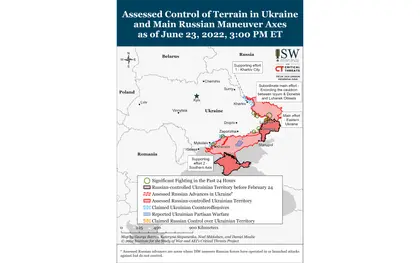Key Takeaways
- Belarusian forces are conducting mobilization exercises along the Ukrainian border but are unlikely to enter the war in Ukraine due to their low capabilities and the adverse domestic implications of military involvement on behalf of Russia.
- Russian forces have likely reached the southern outskirts of Lysychansk and are reinforcing their grouping around Severodonetsk to complete the capture of both Severodonetsk and Lysychansk. These gains remain unlikely to provide Russian forces with a decisive edge in further operations in Ukraine and have further degraded Russian capabilities.
- Russian forces are continuing efforts to encircle the Ukrainian grouping in Hirske and Zolote and are likely moving to take control of these settlements.
- Russian forces have likely successfully interdicted Ukrainian lines of communication along the T1302 highway and are using recent gains along the highway to reinforce assaults on Lysychansk.
- Russian forces amassed equipment and continued building defensive capabilities along the Southern Axis.
Ongoing Belarusian mobilization exercises will continue in Gomel Oblast until July 1 but are unlikely to be in preparation for direct Belarusian involvement in the war in Ukraine.
JOIN US ON TELEGRAM
Follow our coverage of the war on the @Kyivpost_official.
The Belarusian Ministry of Defense announced on June 22 that the Belarusian Armed Forces would conduct a mobilization exercise with the military commissariats of Gomel Oblast to test the readiness of the military reserve from June 22 to July 1. The Ukrainian State Border Guard Service warned on June 23 that Belarusian forces may conduct provocations along the border with Ukraine over the backdrop of these exercises, and Belarusian-Russian military cooperation has seemingly intensified. Belarusian Defense Minister Viktor Khrenin met with Russian Defense Minister Sergey Shoigu in Moscow on June 23 to discuss ongoing bilateral military agreements. Belarusian social media users additionally reported that Russian planes transported at least 16 S-400 missiles and one Pantsir system to the Gomel airport on June 21 and 22.
While Belarus and Russia retain close military cooperation and the ongoing Belarusian exercises are likely intended in part to threaten Ukraine, Belarus remains unlikely to enter the war in Ukraine on behalf of Russia. As ISW has previously assessed, Belarusian President Alexander Lukashenko likely cannot afford the domestic consequences of involving his limited military assets in a costly foreign war. Unsupported Belarusian forces are additionally highly unlikely to be effective, and Russia lacks the reserves necessary to conduct another offensive on Kyiv. These exercises are undoubtedly intended to posture and threaten Ukrainian border areas but are unlikely to pre-empt actual involvement in hostilities.

UK Contracts Arms Makers to Make Artillery Barrels for Ukraine
Russian forces have made substantial gains in the Severodonetsk-Lysychansk area over the last several days and Ukrainian troops continue to suffer high casualties, but Ukrainian forces have fundamentally accomplished their objective in the battle by slowing down and degrading Russian forces.
Head of the Luhansk Oblast Administration Serhiy Haidai stated on June 23 that Ukrainian troops may have to retreat to avoid encirclement in Lysychansk, which indicates that Ukrainian authorities are setting conditions to prepare for the ultimate loss of both Severodonetsk and Lysychansk. As ISW has previously assessed, however, the loss of Severodonetsk and Lysychansk will not represent a major turning point in the war. Ukrainian troops have succeeded for weeks in drawing substantial quantities of Russian personnel, weapons, and equipment into the area and have likely degraded Russian forces’ overall capabilities while preventing Russian forces from focusing on more advantageous axes of advance. Russian offensive operations will likely stall in the coming weeks, whether or not Russian forces capture the Severodonetsk-Lysychansk area, likely granting Ukrainian forces the opportunity to launch prudent counteroffensives. The Kremlin’s ideological fixation on the capture of Severodonetsk, much like the earlier siege of Azovstal, will likely be to the ultimate detriment of Russian capabilities in future advances in Ukraine. The loss of Severodonetsk is a loss for Ukraine in the sense that any terrain captured by Russian forces is a loss—but the battle of Severodonetsk will not be a decisive Russian victory.
Authors: Karolina Hird, Kateryna Stepanenko, Mason Clark, and Grace Mappes
Full report here.
You can also highlight the text and press Ctrl + Enter










